
Warm Bodies, based on a novel by Isaac Marion that I haven’t read, is a modern take on Romeo and Juliet, only this time Juliet meets and falls in love with Romeo after he’s already dead. It is a tale about the power of love to induce positive change and tear down walls even in trying times — of learning to see others as individuals, looking past their superficial group characteristics, and recognizing, even accepting, differences. But all is not moonlight and roses. Life, if one can call it that, among the living and the dead is hard; and even in the end, one cannot eschew entirely a hardnosed realism, as there are some too far gone even for love to heal.
Julie, played by Aussie Teresa Palmer, is the daughter of the military leader (John Malkovich) of an authoritarian, walled compound that houses perhaps the last remaining settlement of living human beings. R, played by Nicholas Hoult, is a zombie who spends his days wandering aimlessly around an airport and occasionally feasting on the flesh of the living. He’s a little off as far as zombies go, in ways you’ll have to see for yourself.
The two meet one fateful day when Julie is out on a pharma-salvage mission with a group of her peers and R is leading a pack of zombies in a hunt for their next meal. Can these two star-crossed lovers make it work? Will the living give R a chance before putting a bullet in his brain? Will R’s fellow undead refrain from eating Julie’s?
[continue reading…]
Help Promote Prometheus Unbound by Sharing this Post
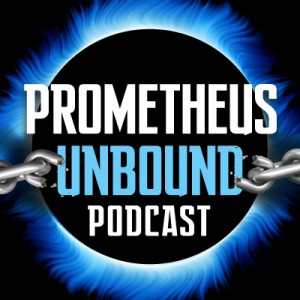
In episode two of the Prometheus Unbound Podcast, Matthew and I (Geoffrey) discuss libertarian speculative fiction and introduce the Book of the Month, Today’s Tomorrows Writing Prompt, and Fiction Forecasts segments of the show.
We break the ice with some brief chit-chat about what we’ve been reading before seguing into our discussion of libertarian spec fic. The Book of the Month is Coyote by Allen Steele. In Today’s Tomorrows Writing Prompt, we turn a speculative eye on the very real possibility of an intellectual-property dystopia. And in Fiction Forecasts, we talk about upcoming (at the time of recording) television shows, movies, and books.
What We’ve Been Reading
Libertarian Speculative Fiction
We covered a lot of ground in our discussion of libertarian spec fic, but we really only scratched the surface of this broad, deep, and no doubt controversial topic. I’m sure we’ll be revisiting many of the stories and issues we covered, and many more besides, in future episodes. So subscribe and stay tuned!
Here’s a brief rundown of some of the things we covered: what qualifies a work of fiction as libertarian; libertarian themes in science fiction and fantasy; why they seem to be more common in science fiction and why libertarians seem to favor this genre; our favorite works of libertarian spec fic; the Prometheus Awards; and probably more that I’m forgetting as I write this.
[continue reading…]
Help Promote Prometheus Unbound by Sharing this Post
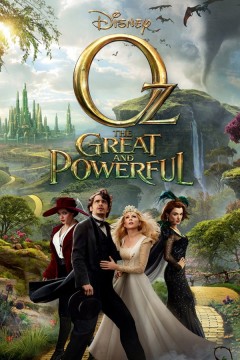

It seems that every classic is to have an entourage. The loneliness of such films as Alien, Star Wars, and King Kong is too much to bear for the hearts of movie execs, so companions are made for them. Sequels, prequels, remakes, and spinoffs are what Hollywood does most, though not necessarily best. At times, this proclivity has born sweet fruit. Though sequels are rarely as good as the original, if the original was any good at all, there have been some smashing successes. Even remakes have some achievements to be noted. I am, however, unaware of a prequel or a spinoff whose makers could hold their heads high and proud once their creation hit the silver screen. Oz the Great and Powerful, a prequel to the 1939 classic The Wizard of Oz, is unable to break out of this trend and be the first.
Set some years before the events of Victor Fleming’s work, it tells the tale of the wizard himself, a travelling magician from Kansas making a meager, day-to-day living. A magician is a trickster, of sorts, and Oscar Diggs (James Franco) has a character well suited to it. Though one gets the sense that at his core he is not entirely amoral, he lies to friend and stranger alike. He lusts after money and women, whom he tricks for his own benefit.
It is this very duplicity in his nature that gets him running from trouble and sets him on course for Oz. After flirting with the wife of a circus strongman, he escapes the enraged husband in a hot air balloon just as a tornado begins to ravage the landscape. As happened in the original film to Dorothy, the tornado transports him to the magical Land of Oz. There, he meets Theodora, a witch played by Mila Kunis.
[continue reading…]
Help Promote Prometheus Unbound by Sharing this Post

At long last, here is the first episode of our new, original podcast.
First, Matthew and I break the ice by briefly talking about what we’ve been reading recently. I had just finished Kameron Hurley’s debut novel God’s War. Overall, I think it’s a good effort with an interesting story and world-building but is not without its flaws. Matthew had recently finished Live Free or Die by John Ringo. It was a 2011 Prometheus Award finalist, not a winner as I mistakenly thought while recording the podcast and, according to Matthew, didn’t deserve to be.
Our interview with Stephan takes up most of the episode. It’s around 53 minutes long and starts 9:40 minutes in. For those who don’t already know him, Stephan Kinsella is a patent attorney and prominent libertarian legal scholar. He is best known for his opposition to intellectual property.
We invited Stephan on the show to discuss the problems of intellectual property and piracy in the Digital Age. But first we had to ask him about his love of science fiction and fantasy. We got him to mention some of his favorite authors and books (see below for a list), and we even talked about the Hobbit movie for a bit.
Then, at about 23:15 in, we dove into the meat of the interview. Stephan explained the historical origin of copyright (censorship) and patents (government grants of monopoly privilege, which is what copyright is now too really), how intellectual property has shaped and distorted the film and publishing industries, including Hollywood’s move to California to avoid patent disputes, and why reform is not enough. We also discussed how the Digital Age — the age of the internet, smartphone, ereader, and globalization — is making the evils of copyright and patents more obvious and acute while at the same time undermining traditional business models built around intellectual property. And finally, we explore ways artistic creators might earn a living in a world without intellectual property laws.
[continue reading…]
Help Promote Prometheus Unbound by Sharing this Post
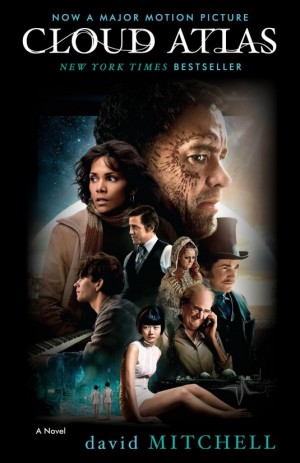
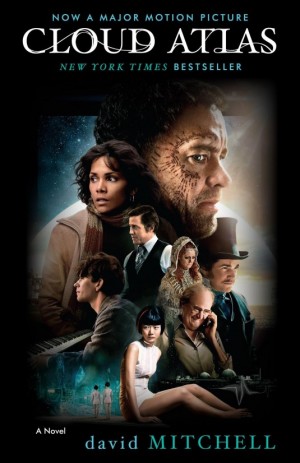
Cloud Atlas, a movie based on the novel of the same name, is a bundle of stories with interconnecting threads meant to form a greater pattern, a message to the viewer. We are all in this together, we conclude by the movie’s end. Sometimes we are nice to each other, and sometimes we are not, but either way our actions resonate into the future, even as they were partly shaped by actions from the past that resonated into the present. The filmmakers are successful in creating this pattern, but as a piece of entertainment and a storytelling vehicle, the movie itself achieves only limited success.
Each story of the larger tale is engaging by itself. That is, the scenario created is interesting enough and worthy of its own movie. The scenes are shot well, and thoughtfully, and the worlds, ranging from far in the past to far in the future, are imaginative conceptions where many other stories might take place. Given this format, it is difficult to summarize the film, which is just as well because watching it becomes more of an exercise in identifying themes and spotting parallels than in following a plot.
The cutting between stories is done in such a way as to prevent momentum from accruing. While I have read many good books that switched between multiple characters to good effect, these books had the characters as part of the same story, so that an advance in the plot of one character’s story had immediate and important ramifications for the other characters, wherever they were in their story arcs. Each chapter usually had a beginning, middle, and end, as if it were its own short story, and finished with some sort of hook to make you regret leaving that character.
In Cloud Atlas, a character in one tale might compose music that another character hears decades later, but the connection is only important for the theme; it has no bearing on the obstacles to be overcome in the endeavor to reach a goal. With only a handful of exceptions, the characters in later times are not even aware of the ones who anteceded them. Imagine taking scenes from Amistad, Blade Runner, Star Wars, Miller’s Crossing, and Three Days of the Condor and mixing them together into one film. As far as the plot goes, this is almost exactly how isolated each story is from the others, how little they have to do with one another.
[continue reading…]
Help Promote Prometheus Unbound by Sharing this Post

Matthew and I recorded a brief promotional spot for the Prometheus Unbound Podcast. It includes part of the intro and outro that you will soon become familiar with as well as information about what listeners can expect from the podcast.
Join us as we
- interview your favorite authors, editors, and libertarian scholars;
- and discuss science fiction and fantasy in books, movies, and television.
You’ll enjoy segments like
- Book of the Month, in which we recommend a great book that ties in with that episode’s theme;
- Today’s Tomorrows Writing Prompt, where we take a current trend in society, explain its causes, and extrapolate how it will play out 10, 50, 100 years into the future;
- and Fiction Forecasts, in which we talk about upcoming books, movies, and tv shows, and predict our reactions.
As well as
- audio reviews;
- tips on writing, marketing. publishing, tools of the trade;
- and listener feedback that we read or play and respond to on the show.
[continue reading…]
Help Promote Prometheus Unbound by Sharing this Post
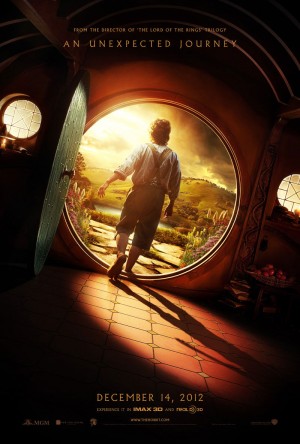

A director returns, after several years and more than one lackluster attempt with other kinds of movies, to a genre he redefined. He had some little known but modestly successful works before his big breakthrough, but since then he just has not been the same man who gave us such an epic, fantastic spectacle full of industry-defining special effects, wonderful music, thrilling action, and, above all, a new world to explore with characters we wanted to accompany. Special effects have come a ways since his magnum opus was crafted, and if used correctly they have the potential to enhance the visual experience even more than before. What could possibly go wrong?
Peter Jackson’s latest project is out in theaters. I wish I could say it was called The Hobbit, but honesty compels me to report that the name is actually The Hobbit: An Unexpected Journey. The reason for the alteration is that The Hobbit will be brought to us not as a short adventure thrill ride, in keeping with the pace and feel of the source material, but rather will be extended into a movie trilogy that, when finished, will outlast a typical BBC miniseries. The motive behind this sort of reverse editing, whereby Tolkien’s notes were raided for things to stuff into the story and plump it up, is Mr. Jackson’s belief that we are stupid enough to triple his box office take if he triples the number of movies to be made from the story. He is probably right. I know I bought my ticket.
Even with his triumphs Jackson had a tendency to let a project get bloated. The best example, I believe, is the sudden barrage of scenes that hit us in The Two Towers right as we should be, could be, would be cruising toward the third act if a drawn-out and apocryphal love story were not fed to us by way of flashbacks, many in a languid, dreamy style that makes one wonder if one has just witnessed something shot wholly in slow motion. When Jackson had over 1,000 pages of material to convert to nine hours of footage this was an annoyance. With The Hobbit, he has fewer than 300 pages to make into nine hours and the filler has now surpassed the beef in the hotdog.
[continue reading…]
Help Promote Prometheus Unbound by Sharing this Post














